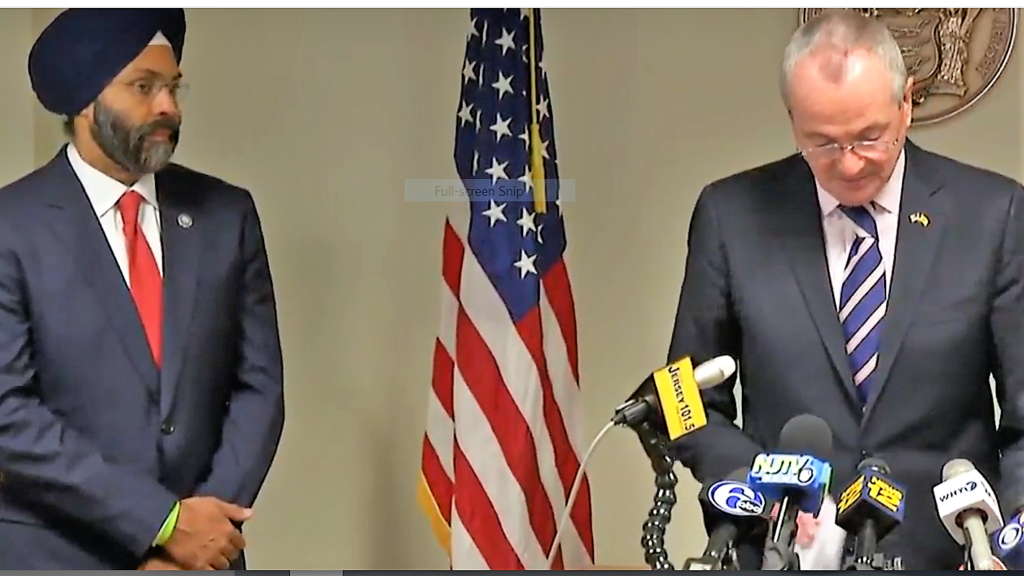AG Grewal Issues Enhanced Law Enforcement Standards Establishing Best Practices for Investigating & Reporting Bias Incidents in New Jersey

AG Bias Incident Investigation Standards last updated in 2000
TRENTON –Attorney General Gurbir S. Grewal today issued updated and enhanced Bias Incident Investigation Standards which mandate a victim- and community-centered approach by law enforcement, electronic reporting of bias incidents, greater inter-agency communication, and continuing training for members of law enforcement. The new standards also expand the definition of bias incident to reflect amendments to New Jersey’s Bias Intimidation Statute that went into effect in 2008.
“With bias incidents trending upward in recent years – fueled unquestionably by certain individuals and groups who exploit hatred and intolerance – it is critical that we employ best practices in investigating and reporting these incidents, and addressing their impact on victims and the community,” said Attorney General Grewal. “Law enforcement must be prepared, from the moment a potential bias incident is reported, to conduct a thorough and complete investigation, while treating victims in a sensitive and supportive manner. We cannot allow those who perpetrate these crimes to succeed in sowing seeds of fear and tension among victims and the community at large. Law enforcement in New Jersey stands united with our diverse communities in pushing back against prejudice and hatred.”
The new Bias Incident Investigation Standards, developed by the Division of Criminal Justice with input from the Division on Civil Rights, law enforcement, and community stakeholders, make a number of significant changes to the prior standards, which were last updated in 2000:
The new standards streamline reporting of all bias incidents by law enforcement agencies in New Jersey. Bias incident reports will be submitted using the new Electronic Uniform Crime Reporting (eUCR) system maintained by the New Jersey State Police. This system allows for centralized and more accurate statistical reporting of bias incidents throughout the state.
The new standards require all County Prosecutors’ Offices to notify the Attorney General’s Office when pursuing Bias Intimidation charges under N.J.S.A. 2C:16-1. This increases communication between the County Prosecutor’s Offices and the Attorney General regarding prosecution of these cases.
In defining bias incident, the old standards only referenced bias based on race, color, religion, sexual orientation, or ethnicity. The revised standards cover additional protected classes added to the Bias Intimidation Statute in 2008, including gender, disability, gender identity or expression, and national origin.
The new standards expand the definition of “bias incident” to encompass any suspected or confirmed violation of New Jersey’s Bias Intimidation Statute. While the standards previously included an incomplete list of predicate crimes, the new standards incorporate by reference the more comprehensive list of predicate crimes and disorderly person offenses in the current statute.
The new standards clarify that to qualify as a bias incident, the suspect and victim do not need to be from a different group or groups covered under the Bias Intimidation Statute. They further clarify that the victim or suspect’s actual membership in a particular group is not an element of the offense of Bias Intimidation, and a mistake regarding the victim’s membership is no defense.
The new standards direct that if a bias incident involves certain enumerated violent crimes, a law enforcement officer is the alleged perpetrator, an organized hate group is involved, or the incident has the potential to generate large-scale unrest, the chief law enforcement officer is required to immediately notify the Division of Criminal Justice and appropriate County Prosecutor by telephone.
Where there is a potential nexus to terrorism, such as when an organized hate group is involved, the new standards mandate that law enforcement make additional notifications to the New Jersey Office of Homeland Security and Preparedness and County Prosecutors pursuant to AG Directive 2016-7.
The new guidelines provide expanded information on the role of the New Jersey Division on Civil Rights (DCR) in addressing prohibited discrimination and harassment, including guidelines on how DCR can accept and investigate referrals and complaints, and clarity regarding the fact that DCR investigations can be launched by the DCR Director without a complaint being filed.
The new standards ensure victims and concerned parties are afforded all of the rights and protections provided under the NJ Constitutional Amendment for Victim’s Rights and the Crime Victim’s Bill of Rights, N.J.S.A. 52:4B-34, et seq.
The final section of the new standards reinforces AG Directives on continuing education for law enforcement on bias crimes and cultural sensitivity, and requires updating of basic training for police recruits in these subject areas. The AG’s Community-Law Enforcement Affirmative Relations (CLEAR) Institute has developed a mandatory course in Cultural Diversity, De-Escalation and Bias Crime Reporting. That course covers police interactions with various faiths and cultures, as well as recognizing and reporting bias crimes. The final section of the standards addresses the CLEAR Institute and academy training. It directs that the Division of Criminal Justice, and law enforcement and community stakeholders, regularly update the curriculum for these mandatory courses.
“We are grateful to the law enforcement and community stakeholders who worked with us to ensure that these new standards address the critical issues and concerns surrounding bias incidents and their investigation by law enforcement,” said Director Veronica Allende of the Division of Criminal Justice. “Bias incidents pose a special threat because of their capacity to traumatize victims and create tension in a community. These standards ensure that law enforcement responds effectively and sensitively when these incidents occur.”
Attorney General Grewal thanks the following agencies and organizations that guided and provided input in the development of the new standards:
Division of Criminal Justice
New Jersey State Police
Division on Civil Rights
Elizabeth E. Ruebman, Office of Attorney General, Victim Services
Office of Homeland Security and Preparedness
County Prosecutors Association of New Jersey
County Chiefs of Detectives Association
New Jersey State Association of Chiefs of Police
New Jersey Bias Crimes Officers Association
Anti-Defamation League
Garden State Equality
New Jersey Muslim-Jewish Advisory Council
Sikh American Legal Defense and Education Fund
Sikh Coalition
United Sikhs
####





